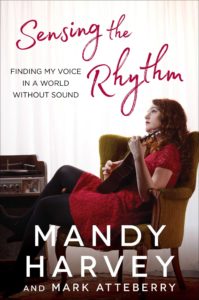Review: ‘Sensing the Rhythm’ by America’s Got Talent Star, Mandy Harvey
by Beth
North American music fans know Mandy Harvey from her stunning appearance on America’s Got Talent. The 19-year-old was pursuing a music career when a rapid decrease in her hearing left her completely deaf. Her memoir, Sensing the Rhythm, was recently reviewed on a blog called Life Unscripted: Life as I See it…or Don’t.
I’ve always appreciated the way Life Unscripted reviews books about disabilities, and when I asked if we could publish an excerpt here, they generously said yes. I hope you’ll read to the very end — the final line says it all.
Sensing the Rhythm: Finding My Voice in a World Without Sound
By: Mandy Harvey and Mark Attberry
 The publisher of Sensing the Rhythm summarizes Mandy Harvey’s memoir as “a deeply moving story about Mandy’s journey through profound loss, how she found hope and meaning in the face of adversity, and how she discovered a new sense of passion and joy.” Even though the publisher’s summary talks a lot about inspiration and overcoming adversity, I found this short book more approachable and relatable than I expected to.
The publisher of Sensing the Rhythm summarizes Mandy Harvey’s memoir as “a deeply moving story about Mandy’s journey through profound loss, how she found hope and meaning in the face of adversity, and how she discovered a new sense of passion and joy.” Even though the publisher’s summary talks a lot about inspiration and overcoming adversity, I found this short book more approachable and relatable than I expected to.
Initial Impressions
I chose to listen to this book in audio format, narrated by Mandy herself. Mandy’s narration lends additional warmth to her breezy, accessible style of writing. I was immediately transported to an unforgetable performance where, without words, all musicians knew exactly where to be and what to do.
We are taken on Mandy’s journey with her – from the rapid decrease in her hearing to her time of depression to her discovery that she could still sense the rhythm of music. I laughed and cried with Mandy, and some portions of her journey really made me think. I found this short book more approachable and relatable than I expected to.
Disability Identity
Mandy chooses to communicate using sign language, something she thought was important to use during her performance. Her deafness is as much a part of herself as her musicianship, and I found myself feeling a complicated sense of sorrow and frustration when Mandy relates her experiences in early college as her hearing loss was progressing. She asked for an accommodation to learn an assignment and was denied that request.
When students stood up for her, she admitted feeling like a burden, feeling uncomfortable, feeling like her hearing loss made her stand out. I found myself relating to and frustrated by her feelings of her disability experience and the reactions of those around her.
More than Disability
Yes, Mandy is deaf, and yes, she’s a musician. But she has some insights about life that are not exclusively disability-related. In particular, I found her formula for success to be an incredibly insightful look at talent and determination. Her hard-won insights on supporting a loved one through a life-changing event — based on what she found helpful and what she didn’t — may not be revolutionary, but they are told in a gentle and powerful way.
Mandy neither makes herself out to be a saint or a martyr, but as a woman who has made mistakes and chosen to learn from them. There are some portions of her book that some might find preachy (Mandy is a born-again Christian), but they are generally interwoven with her own lived experiences, adding to their tapestry rather than jutting out at odd angles.
Conclusion
I usually prefer longer books and getting to know characters and real people. But Sensing the Rhythm is a short tome that I’m glad I picked up. It’s not a literary masterpiece, but it can be as easy or as profound as you, the reader, make it out to be.
Much like all of us.






